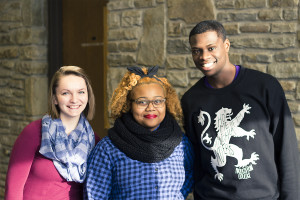Black Heritage Club is not just for black people. Black Heritage Club is a place for people of all races to gather and engage in honest communication. This is the goal according to President Nailah Pressley, sophomore, “This year I really want to focus on bringing people together, and getting to know one another aside from racial differences.” This ambition is evident through the events Black Heritage Club has planned for campus during Black History Month. Each occasion provides an opportunity for fellowship and conversation, starting with Soul Food Night on Thursday, February 19th.
 Club Communications Director Travis Trotman, sophomore, commented on the convenience of this year’s Soul Food Night versus previous years: “Last year we had it in Gillette and you had to get a ticket beforehand…this year, because it’s up in the cafeteria it lets everyone participate. We have some things planned, and we’re going to be playing soul music, and it will be a very interactive night for anyone who wants to come.” The Club will also be screening the new ABC television show Black-ish down in Big Al’s on Wednesday the 11th and the 18th, as well as facilitating a discussion with responses to the show afterward. Pressley said the club picked Black-ish in particular because, “It deals with racial issues in the world today but I also feel like it’s a show that anyone can relate to.”
Club Communications Director Travis Trotman, sophomore, commented on the convenience of this year’s Soul Food Night versus previous years: “Last year we had it in Gillette and you had to get a ticket beforehand…this year, because it’s up in the cafeteria it lets everyone participate. We have some things planned, and we’re going to be playing soul music, and it will be a very interactive night for anyone who wants to come.” The Club will also be screening the new ABC television show Black-ish down in Big Al’s on Wednesday the 11th and the 18th, as well as facilitating a discussion with responses to the show afterward. Pressley said the club picked Black-ish in particular because, “It deals with racial issues in the world today but I also feel like it’s a show that anyone can relate to.”
Other main events include the showing of the critically acclaimed film Selma on March 6th, featuring David Oyelowo’s portrayal of Martin Luther King Jr. and the ongoing fight for civil rights in 1965. The Black History Club has also managed to secure the Reverend Marvin McMickle, Houghton’s CLEW speaker in 2014, for the last chapel of the month.
The Club has changed its focus under the leadership of Pressley, in comparison with previous years. Secretary and Treasurer Lauren Lund, junior, has been a member since she was a first year and said, “It has definitely changed—different cabinets have different goals and that orients the type of activity we do. I know last year [then President] Katrina Sawyer was more focused on education and lectures. And my freshman year, Julian Cook focused most on outreach.” Pressley commented her main focus on the club is, “to encourage people to talk. Even if you disagree with what I think, what I’m saying, then let’s at least have a conversation. Because nothing happens when people don’t talk.”
Pressley speaks about how her goals for the club changed as her perspective changed: “I came into this position wanting mostly to inform people, talk about what black history is, why this is important…but after listening to a lot of the feedback here on topics of race, I just realized that we need to connect on a human level first, and then we can get to the hard-hitting issues. So, I listen and observe a lot more.”
Lund says that her involvement in the club has been invaluable in terms of broadened horizons: “It’s interesting because [while I’ve been involved] different events have happened both outside and within campus that relate to controversial social issues. To listen to different inside perspectives, how people are affected by these events, it really affects the way you think of things…I don’t just see the events, I think how would my friends be affected by this? It’s so important to learn how other people feel about things, not just your own opinion on how they should feel.”
